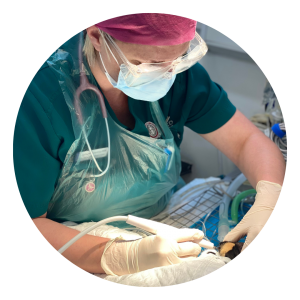Veterinary Nursing Awareness Month is a time to celebrate the dedication and skill of our veterinary nurses. We are proud to have Samara at our Barking branch, who joined us in 2010 and qualified as an RVN (Registered Veterinary Nurse) in 2018. Sam is the feline advocate at the branch and has completed the ISFMCert in feline nursing. We caught up with Sam for a quick glimpse into A Day In The Life Of…
What is your morning routine?
On arrival, I care for our resident practice cat Tilly, clean and change her litter tray, and set her up ready for the day in reception where she generally sleeps on the desk and ignores us all! I then check the procedures list, prepare the kennels and paperwork such as consent forms and GA sheets and ensure the consulting room is fully equipped for consults. I then check through emails and PetsApps (our telemedicine platform) and reply in order of urgency and mark for the attention of the relevant team member. Once the practice is ready for the day, we open up and welcome clients in. During this time I will run admissions for the day’s routine procedures which involves a sit-down discussion and going through the consent forms, procedure, and any extras.
What is your afternoon routine?
My afternoons are either in theatre whereby I assist the vet with surgical procedures, placing intravenous catheters and prepping the patient for the procedure, monitoring anesthetics/sedation, or performing minor procedures such as dental descales and polishing and radiography.
Or, they are filled with nurse consultations! These are generally post-operative checks, second vaccinations, blood pressure monitoring, subcutaneous fluid administrations, client education, ProActive Pets examinations (our preventative healthcare plan), weight clinics, and blood sampling. After all this comes evening consultations and discharges.
What are your responsibilities as an RVN?
As the Barking practice’s main RVN, my responsibilities vary but typically include overseeing the everyday running of the practice, ordering medications/consumables/equipment, training and mentoring junior staff members, running nurse clinics, giving dietary and nutrition to clients, monitoring anaesthesia/sedation, blood sampling, conducting minor procedures such as teeth cleaning, placing IV catheters and preparing patients for procedures. As an RVN, I am also responsible for overseeing the hygiene and sterility of the practice, the maintenance of clinical equipment and most importantly, the well-being of our patients. I have a certificate in feline nursing which allows me to assist new kitten owners give their kitten the best start in life. I also help by advising clients in cat behaviour/care and providing information on feline behaviourists where necessary.
What do you enjoy most about your role as an RVN?
Client interaction and consulting. I am currently undertaking a certificate in nurse consults, tying this with my certificate in feline nursing. This is the part of my job I thrive on and love to help and guide clients along the way to help maintain harmony at home and hopefully create a long-lasting happy relationship with their pet.
I have been at the Barking practice for almost 12 years and love every animal that comes through the door as if they are my own. I love watching them grow and develop and keeping the bond that only animals can provide.
We are very proud to employ so many great RVNs like Samara and, as it’s Vet Nurse Awareness Month you may see #VNAM and #OurProfessionMyResilience across social media, so, if you do, please click on them to see what vet nurses are up to. You see, we value our vet nurses for the care they bring to you, your pets, and the veterinary team. If you are interested in joining the Goddard Veterinary Group, please check out our opportunities online or learn more about our very own Nursing College!

